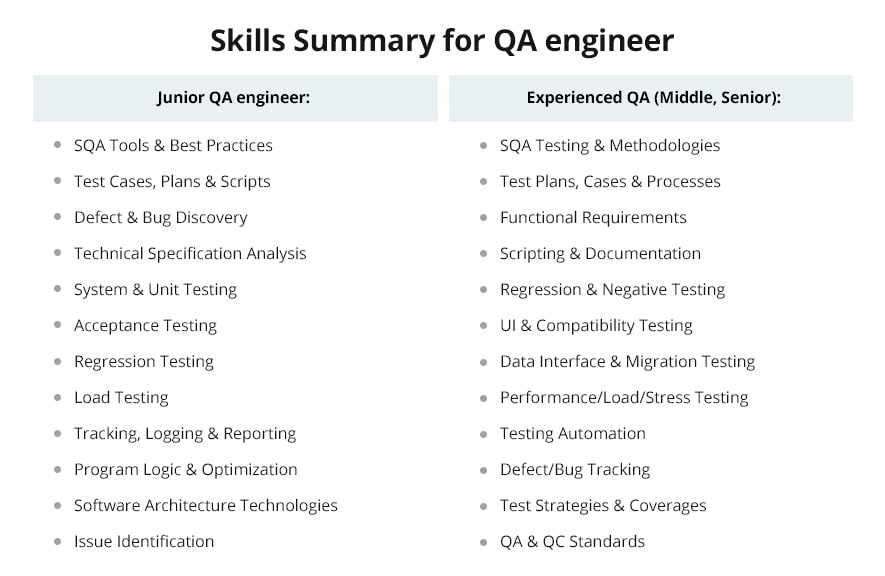- QATestLab Blog >
- QA Basics >
- How to Craft Superb QA Engineer CV: Guide + Interview Tips
How to Craft Superb QA Engineer CV: Guide + Interview Tips

Wanna get a job you have always dreamed about? Start with Curriculum vitae (CV). Skills, experience, personal data. In times of high competition in the market, a good CV isn’t just about writing sweet words about the stuff above. It’s about creating an excellent first impression. What are the criteria, style, and requirements for such a CV for a QA engineer that will win recruiter and employer hearts? Today, QATestLab is sharing secrets.
Strategy to Write a QA Engineer CV Your Employer Will Like
Let’s face reality. Today the demand for developing software products is high, so is the need for software testing. In a typical day in the office, the human resources department has no time to interview all the applicants. Among thousands of CVs, they have to select the most suited ones. How to get into the number of those few targeted QA engineers that recruiters select? We believe this strategy is the key:
#1 Searching for offers that spark a light in you
Don’t rush into all the job offers existing on the web. Be selective. Among a variety of choices, try to find the closest ones to your expectations, ambitions, and experience. Sending your CV to every job position you will find is the worst thing you can ever do. Doing so, you lose the battle without even starting it.
The process of searching is the first step that defines all the subsequent success of your CV writing. The fewer options you will have, the more precise understanding you will have of how and in what direction you should go. That’s the point that builds all your motivation up. So don’t be afraid to waste some time here.
#2 Customize your CV for each job
Once you select desired job offers, you will gain a precise picture of expectations of the companies you want to apply to. Quite possibly, these expectations will be different for each vacancy. That’s why you need to literally feel the required approach and adapt your CV for every case separately.
Just accept the fact that sending one template to many companies is a solution that is unlikely to please you with the desired results. Edit your CV for different job applications to increase your chances. Don’t list all your experience – include only what’s relevant for this particular job. Remember, grammar fluency is not geeky.
#3 The art of Impression
Your CV is more than just a document.
It’s a tool for marketing yourself.

CV is a way to market yourself, and good marketing works if only it is narrowly focused on the expectations. Remember, you have only 10-seconds to show that you correspond to these expectations, and that’s all the secret behind making a good first impression.
All critical keywords for the position must be on the first page and visible to the reader. Consider what is essential to the employer and make sure that it is on page one. Look for particular points of interest and relevance. Your CV needs to get you an interview and is essentially nothing more than an “elevator pitch” on paper.
#4 Mention your top skills
Highlight relevant skills. Don’t name every single technology you’ve worked with. As an extreme example, there is no need to mention obvious applications like Microsoft Office. Everyone knows MS Word, but not everyone knows Git, or WebDriver, or TestRail, or JMeter, etc.
Choose to either group your skills and technologies into categories, and make an expanded list. Alternatively, list your core skills and techniques with a self-rating, and how well you’ve mastered them. List 4 to 6 core competencies that you possess: types of testing you are familiar with, types of projects you have already tried your hands on, etc. Focus on your strong sides, showcase your achievements, and the value you brought to your previous projects.
#5 Brevity is the soul of wit
Living in the era of information, we all prefer the so-called diagonal reading. And there is absolutely no crime in that. If the information doesn’t contain any significant meaning for us, all we have to do is to ignore it. Do you want your CV to be ignored? If no, then choose brevity.
Making your resume six pages long when you have 2-3 years of experience is nonsense. Choose the critical knowledge and skills that you have and that you think can work wonders! For example, you are well versed in manual testing and can perform a full range of test types for this. Try to describe these skills as concisely as possible, and don’t use 20+ bullet points for it.
#6 Make your interview a conversation
The last but not least important advice. Don’t try to be perfect during your job interview. Just sit and have a chat. Talk about stuff, because this means everything. Show yourself off, not just your career. Be empathetic. When things come to questions connected with software testing and QA, thinking of those annoying what-if questions a child asks is the heart and soul of being a QA, not coding, not experience; these things you can eventually get.
Finally, Insights
A good CV is your bread and butter for becoming closer to your dream job. Since there is a very thin line between what is necessary to include and what is not, don’t neglect all the tips described above. After all, the secret to making CV as clear and compelling as possible depends on one major message: “This is how I made things better for my employers.”
……………………………
Contact us, or visit our blog to read more about QA & testing. Let’s grow together!
Learn more from QATestLab
Related Posts:
- What Attracts Attention to A Resume on QA Position?
- How to Write Resume for a QA Position?
- When Bugs Tank Your Rankings: How QA Testing Drives SEO Performance
About Article Author
view more articles
has more than 2-year experience in blogging and copywriting, copyediting and proofreading of web content.
View More Articles







No Comments Yet!
You can be the one to start a conversation.